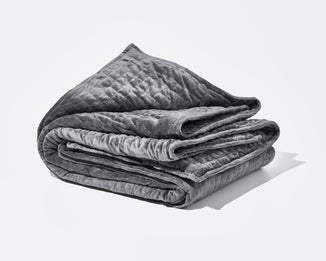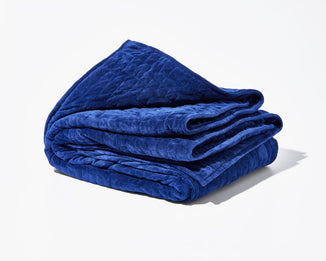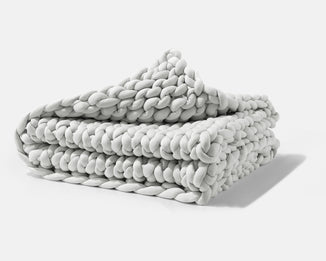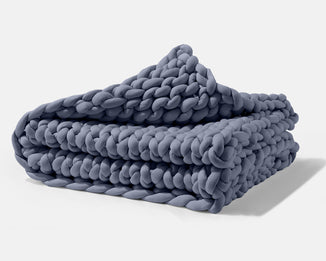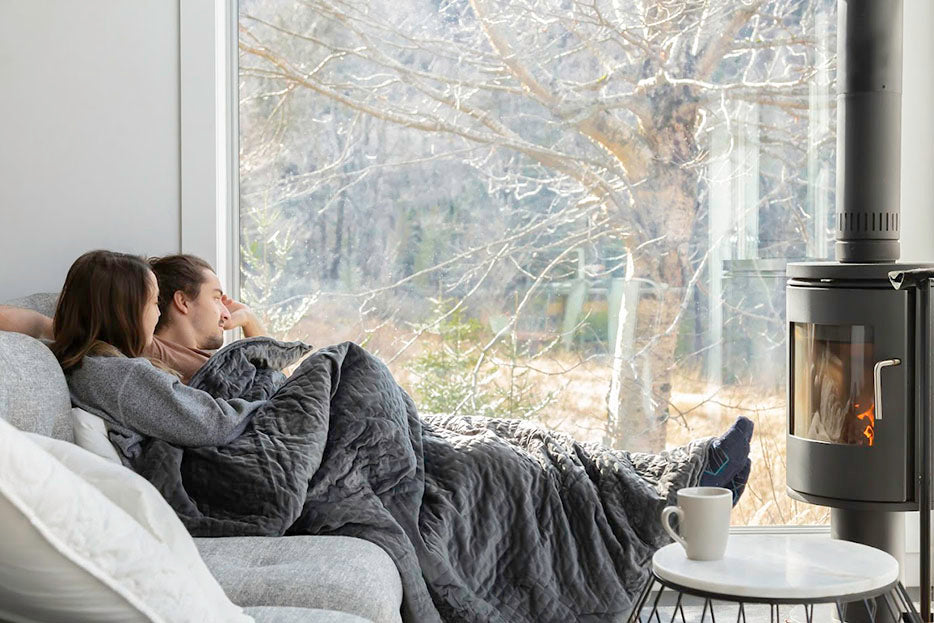
Dec 06, 2021
Can a Weighted Blanket Be Too Heavy? Your Questions Answered

With every passing day, weighted blankets seem to become more and more popular. These therapeutic blankets have gained a lot of traction for their ability to promote a calmer state of mind and usher in a good night's sleep. The secret to their stress-busting, sleep-inducing effects is deep touch pressure stimulation, a popular and effective technique that uses firm but gentle pressure to relax the nervous system.
Weighted blankets use their sizable heft to apply deep touch pressure to the body, which triggers the production of mood-boosting chemicals like serotonin and dopamine while reducing cortisol, the stress hormone. This puts the user into a state of contentment and relaxation, making it easier to drift off to sleep.
Knowing this, it can be tempting to buy the heaviest weighted blanket you can find. But is this safe? Can a weighted blanket be too heavy?
Yes, a Weighted Blanket Can Be Too Heavy
Weighted blankets offer a host of benefits, from lower stress levels to the ability to reduce chronic pain. But in order to reap their advantages, you need to choose the correct weight. Why? Because using a weighted blanket that is too heavy can result in the following problems:
- Discomfort. The main problem with using an overly heavy weighted blanket is that it can be uncomfortable, especially for people with chronic pain. If you struggle with arthritis, fibromyalgia, lupus or run-of-the-mill muscle soreness, putting excessive pressure on your body can worsen your pain and make it difficult to relax.
- Anxiety. If you easily get claustrophobic, you may want to err on the lighter end of the weighted blanket range. An overbearing weighted blanket can increase the feeling of being trapped, which can elevate your stress levels and make you feel panicky.
- Overheating. Another problem with going too heavy with your weighted blanket is overheating. Heavier weighted blankets tend to have more material and fillers, which can make you feel too hot at night. Although you could always opt for a cooling weighted blanket, you’ll still want to choose the correct weight to maximize your rest and relaxation.
Get Your Cooling Weighted Blanket
Note: If you have respiratory or circulatory issues, such as sleep apnea or diabetes, consult a doctor before using a weighted blanket.

How to Tell if a Weighted Blanket Is Too Heavy
When using your weighted blanket for the first time, it may not be immediately apparent if it’s too heavy or not. Give yourself about a week to adjust to the new weight and play around with the blanket in different areas (on the couch, in bed, etc.).
In the meantime, watch out for the following signs indicating that your weighted blanket is too heavy:
- You struggle to move underneath the blanket
- You feel more anxious and panicky while using the blanket
- Your blanket feels constricting (as opposed to a gentle hug)
- Your blanket causes pain or otherwise unpleasant sensations
What Is the Optimal Weight for a Weighted Blanket?
So, how heavy should a weighted blanket be, exactly? The answer to that question depends on several factors, including your personal preference and whether or not you’ll be sharing the blanket with another person. But mostly, it comes down to your body weight.
Most weighted blanket manufacturers — including the experts here at Gravity Blankets — recommend choosing a weighted blanket that comprises roughly 10 percent of the user’s body weight. This means that most weighted blanket users will probably want to choose a weighted blanket that is somewhere between 12 and 20 pounds. This range usually provides enough pressure to induce a state of relaxation without making the user feel confined or uncomfortable.
That said, studies have shown that the average adult can safely sleep under a weighted blanket weighing as much as 30 pounds. If you weigh more than the average adult or enjoy the feeling of more pressure, you may want to choose a heavier blanket.
Can Weighted Blankets Be Too Heavy for Children?
Babies and toddlers aren’t good candidates for weighted blankets, as they can get trapped underneath and suffocate.
When choosing a weighted blanket for a child, it’s critical to choose a safe weight. Kids — particularly those with autism — may be more sensitive to the pressure of a weighted blanket. To set your child up for a good experience, make sure you choose a weighted blanket that is no more than 10 percent of their body weight.
If you’re interested in buying a weighted blanket for your child, check out our Gravity Kids’ Blanket. Designed for children ages seven and up, the Gravity Kids’ Blanket offers the same stress-reducing and sleep-enhancing benefits as our best-selling Gravity Blanket, but in a kid-friendly format.

Find the Perfect Weighted Blanket at Gravity Blankets
So, to answer the question — “Can a weighted blanket be too heavy?” — the answer is yes, it most definitely can. A weighted blanket should make you feel like you’re being hugged, not squeezed or smothered. To that end, we highly recommend trying our best-selling Gravity blanket in a weight that is approximately 10 percent of your body weight. With the correct size and weight, you’ll look forward to cozying up with your weighted blanket every night!
Your use of this website, its content, and any products obtained through this website is at your own risk. This website, its content, and any products obtained through this website are provided on an “as is” basis, without any warranties of any kind, either express or implied, including warranties of merchantability, infringement of intellectual property, or fitness for any particular purposes. No warranty or representation is made with respect to the completeness, reliability, quality, or accuracy of this website or its content. This website, its content, and any products obtained through this website do not constitute medical treatment and is not a substitute for a medical examination or diagnosis. If you are dealing with a health condition check with your health care provider before using. This website may contain affiliate links that allow us to earn a commission on purchases made through such links. We may accept forms of advertising or sponsorships in connection with this website. There might also be paid topic insertions. We may accept and keep free products, services, and other forms of compensation from others.
